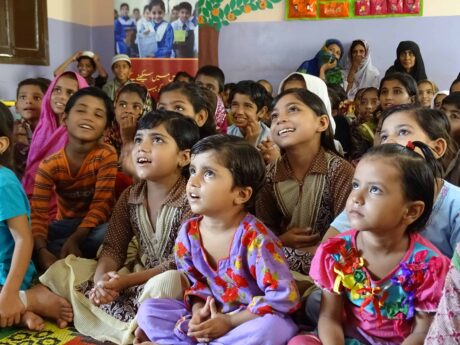Sindh, PakistanOne sunny afternoon in September, the Government Boys Primary School in the remote Thano Bullah Khan village transformed itself into a reading extravaganza.
Hundreds of children, teachers, government officials and parents from the village, along with 20 surrounding schools and communities, flocked to the primary school to take part in games, activities and performances focused on boosting literacy and promoting a culture of reading.
“You would not believe how much children from all schools have enjoyed themselves here. I have no words to explain their excitement,” said Tara Sharma, a teacher at the Government Girls Primary Main School in Thano Bulla Khan.
Attended by more than 1,000 students, the Sept. 8 International Literacy Day event was organized by Kohistan Readers Network, a group of more than 35 educators in the region dedicated to promoting sustainable literacy in the community.
The teachers were inspired to create the group after receiving early grade reading teacher trainings from the Pakistan Reading Project, a nationwide project funded by the U.S. Agency for International Development (USAID).
This five-year project aims to support the provincial and regional departments of education throughout Pakistan to improve the reading skills of 1.3 million children in first and second grades. It is implemented by the International Rescue Committee and its partners Creative Associates International, World Learning and the Institute of Rural Management.
First-of-its-kind celebration
As a first-of-its-kind event in the region, the reading festival also caught the attention of senior government education officials, many of whom joined in the activities.
“This is first time in the history of Thano Bullah Khan that such kind of event has been organized for students. It is wonderful and very successful!” said Faqeer Dad Khoso, Member of the Sindh Provincial Assembly.
He congratulated the USAID-funded Pakistan Reading Project team for its work and their dedication towards promoting a culture of reading.
The event organizers at the Kohistan Readers Network were also encouraged by the outcomes festival, which included read aloud sessions, story making, eyesight testing, teacher lesson demonstrations and more.
“This is the very first time in my 29 years of service that such a huge reading festival is held in our town,” said Muhammad Bachal, head teacher at a nearby school and leader of the Kohistan Readers Network.
Bachal added that in addition to rallying the community around the cause of reading through the festival and other campaigns, the Pakistan Reading Project has provided him with new methods for teaching early grade that are having a profound effect on student learning.
“I adore the teaching methods of [the project] as it’s having great output in student learning…. I even try to convince teachers from non-project intervention schools to adopt these new methods,” he said.
Teachers take ownership
With support and inspiration from the USAID-funded Pakistan Reading Project, similar reading festivities have also taken place in other districts of Sindh including Matiari, Shaeed Benazriabad and Karachi.
In the Tando Allah Yar district, for example, 14 teacher support groups, known as Teacher Inquiry Groups, from 44 schools gathered for a mega-festival featuring 30 stalls hosting reading competitions, storybook writing and other activities and games.
The event was attended by more than 1,200 children, teachers, project mentors, government officials and community members, among them a large number of female learners, educators and community members.
This high rate of engagement of girls and women in the Tando Allah Yar district festival was commended by the district’s education office, including Tabasum Pathan, Taluka Education Officer.
“This is a great opportunity for the teachers to showcase their learning. I am seeing that many female teachers of my region have worked hard for the event,” she said.
She added that among male and female teachers alike, the educators’ energy and commitment to carry forward education reforms and new teaching methods introduced by the USAID-funded Pakistan Reading Project is a positive sign that these gains in early grade reading will be sustained.



